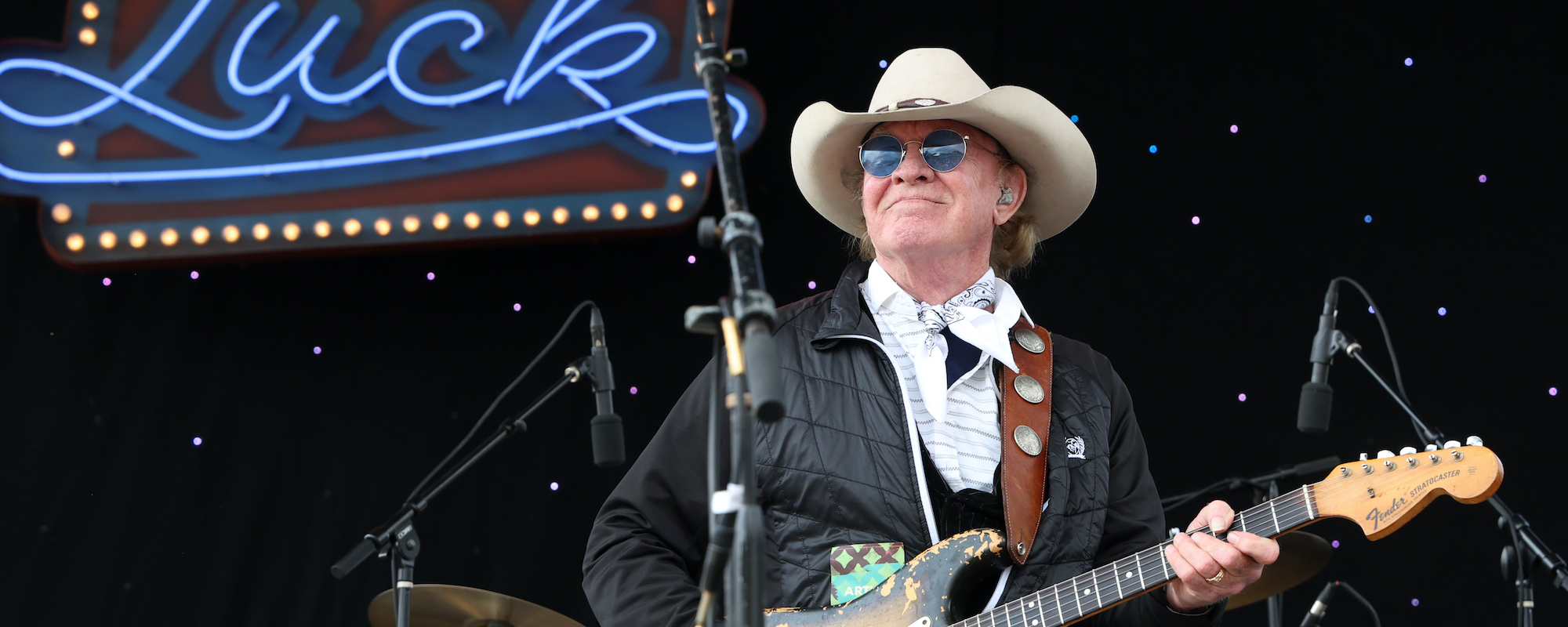If you are only familiar with the songs “King of the Road” and “Dang Me,” you must listen to Roger Miller more. The singer from Erick, Oklahoma, won 11 Grammy Awards for those two songs, but he contributed much more during his career as a songwriter, performer, and actor.
Videos by American Songwriter
He was born in Fort Worth, Texas, in 1936, but his father died from spinal meningitis the following year. Unable to provide for her son during the depression, his mother sent Miller to a farm outside of Erick to live with his Uncle Elmer and Aunt Armelia Miller.
Let’s take a look at five fascinating facts about Roger Miller.
Sheb Wooley Bought Miller a Fiddle
Miller picked cotton, plowed the fields on the farm, and went to a one-room schoolhouse. He joined the Future Farmers of America but had his sights on something different. In 1940, his cousin Melva married Sheb Wooley, who befriended young Miller. He showed the youngster some guitar chords and bought him his first fiddle. Wooley would have a successful career as a singer and actor.
Music was a constant as Miller tuned into the Grand Ole Opry radio show and was a fan of Hank Williams, Bob Wills, and the Light Crust Doughboys. The urge to write songs led the 17-year-old to steal a guitar. He turned himself in a day later and was given a choice to join the U.S. Army or go to jail. He chose to enlist in the Army. He later remarked, “My education was Korea, Clash of ’52.” While in the service, he played fiddle in the Circle A Wranglers, which featured Faron Young. While stationed in South Carolina, Miller met the brother of Kenneth “Jethro” Burns of the musical duo Homer and Jethro, who encouraged him to go to Nashville after his discharge.
Miller Played Fiddle for Minnie Pearl
After leaving the Army, Miller went to Nashville and looked up Chet Atkins. He was not exactly embraced with open arms by the legendary producer. Miller got a job as a bellhop at a hotel. He shared his memory of that time on Nashville’s Ralph Emery Show, “When I first got out of the Army and came here, I had to get a job, so, reluctantly, I took a job as a bellhop at the Andrew Jackson Hotel. Well, at night, usually, I hung out around WSM. One Friday evening at the Friday Night Frolics, Johnny Johnson, a guitar player on the Opry and a musician around town, was trying to put a band together. He said that Minnie Pearl was going out. This was right after I’d gotten here. She was gonna do a summer tour of fairs, and she needed a band, needed a fiddle player, and I said, ‘Hey! Here I am.’ I knew a couple of songs on the fiddle. Mel Tills was the guitar player in the band, and Minnie and Henry (Pearl’s husband) have been dear friends ever since. I used to sing my songs, I’d do ‘Fraulein.”
Miller went on to play guitar with George Jones and became the bandleader for Ray Price.
Miller Signed a Songwriting Deal with Tree Publishing in 1958
Miller was always working on songwriting. One night, while hanging around Tootsie’s Orchid Lounge, the famous watering hole on Nashville’s Lower Broadway, he met Buddy Killen, who worked for Tree Publishing. After playing several songs for Killen and his boss, Jack Stapp, Miller was given a $50-a-week salary. He went on to have songs recorded by Ernest Tubb, Ray Price, Faron Young, Donny Young (who would later become Johnny Paycheck), and Jim Reeves. Killen would later say that everything Miller said was a potential song.
Miller talked about the group of songwriters and musicians he ran with in those early days: “There was Justin Tubb, and Willie Nelson came along a little later. Bill Anderson and Hank Cochran, and it would all start at Tootsie’s. There was a group of musicians that were in that group, too. Buddy Emmons, who to this day is one of my dearest friends, and there was Jimmy Day, and it seemed like there were a lot of steel guitar players. Big Ben Keith and we all would hang out with each other and sell each other each other’s cars. I had a couple of cars that I bought from Big Ben for $100 apiece. You know, one of us would need $100, the other one would buy his car. It was really a pack. I won’t say a pack of hounds, but it was a pack.”
Miller released a few singles as a singer on the Decca and RCA record labels, but they didn’t have much success. It wasn’t until Miller signed with Smash Records that things took off. Producer Jerry Kennedy finally found the formula for the singer’s success. “Dang Me,” “Chug-A-Lug,” “Do-Whacka-Do,” “King of the Road,” and “Engine Engine #9” were all smash hits. In 1964 and 1965, Miller took home 11 Grammy Awards.
Miller Won a Tony Award for Best Score for Big River
Miller went through an incredible string of songwriting output followed by a drought where he barely wrote. Occasional albums were released from 1970 to 1984, followed by his work on the Broadway show Big River. It was an adaptation of the Adventures of Huckleberry Finn.
Miller recounted how he became involved with the production: “I was approached to do this by a man who, back in the early ’60s, was a professor at Yale. He taught theater critique and drama. I met him in about 1982; years later, I was playing the Lone Star Cafe in New York City, and this man came and started talking to me. He had loved my work for many years, and he would quote me lyrics that I had written, from ‘Half a Mind’ to ‘Big Harlan Taylor.’ He knew every lyric to every song I’d ever done. I’d never met a scholar of my work, and he told me he had produced one Broadway play, Pump Boys and Dinettes.
“He told me it had always been his dream to get my work together with Mark Twain, and I said, ‘Well, it’s a little late, isn’t it? ’cause Twain can’t defend himself,’” he continued. “He said that he had this wonderful idea if I would write music to Huckleberry Finn, it would be a great Broadway musical. And, of course, my vision—I’ve always had vision for music, but I never had thought about stuff like that. He would walk with me and talk with me. His name was Rocco Landesman, and he would talk with me about qualities of lyrics and different levels of things. He convinced me. He said, ‘You’re the only man who can do this.’ And I said, ‘Really?’ and he said, ‘If you don’t do it, I won’t do it.’ He said, ‘If you will write the songs, I will clear the way for you. I will get you the book written. I will get the investors together and clear the way for you.’”
The show was a big hit, winning seven Tony Awards.
Miller Was Also An Actor
Miller was given his own television show on NBC after the success of “King of the Road.” In 1973, he provided the voice of minstrel Allan-a-Dale in the Disney production of Robin Hood. He sang “Oo-De-Lally,” “Not in Nottingham,” and “Whistle-Stop.” In 1977, he provided the voice for Spieltoe in the Rankin/Bass holiday special Nestor, the Long-Eared Christmas Donkey. Miller also appeared in the TV series Daniel Boone, Love, American Style, The Muppet Show, Sesame Street, Quincy M.E., and Murder, She Wrote. He also played the part of Pap in Big River.
In 1991, he was diagnosed with lung cancer. He died on October 25, 1992. He was 56. Roger Miller was inducted into the Country Music Hall of Fame in 1995.
When you purchase through links on our site, we may earn an affiliate commission.
Photo by Don Paulsen/Michael Ochs Archives/Getty Images













Leave a Reply
Only members can comment. Become a member. Already a member? Log in.